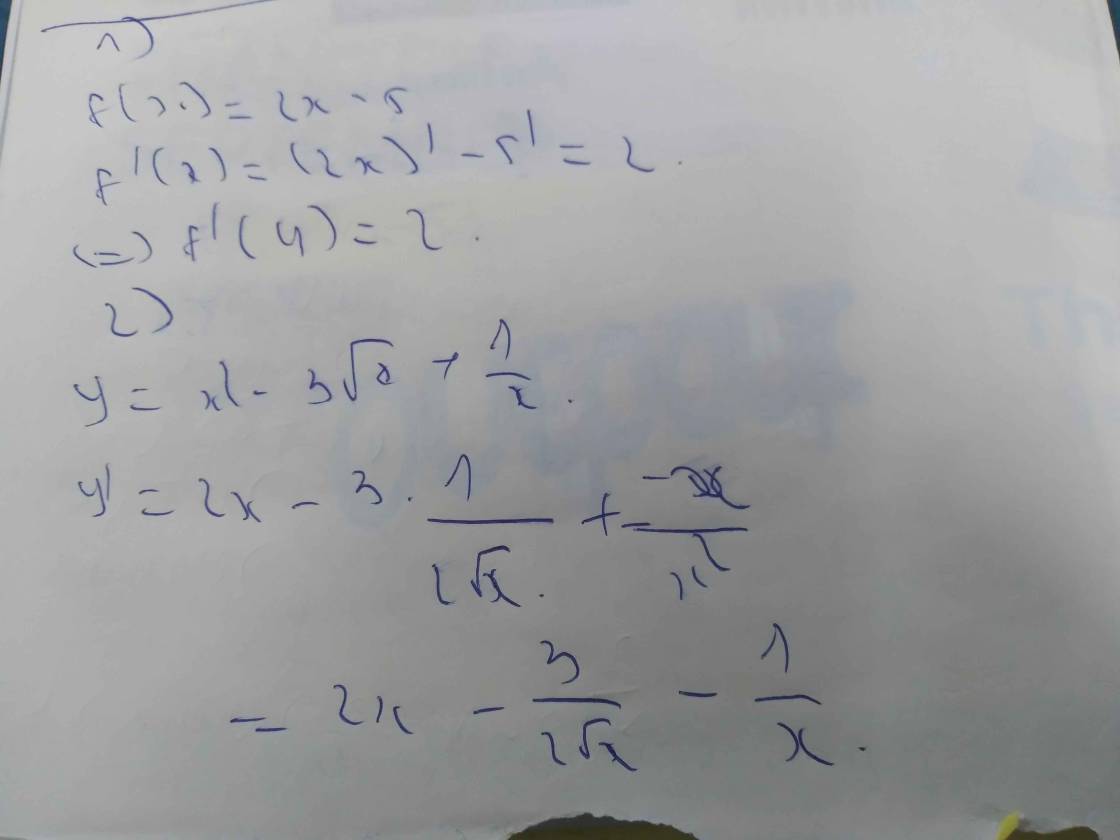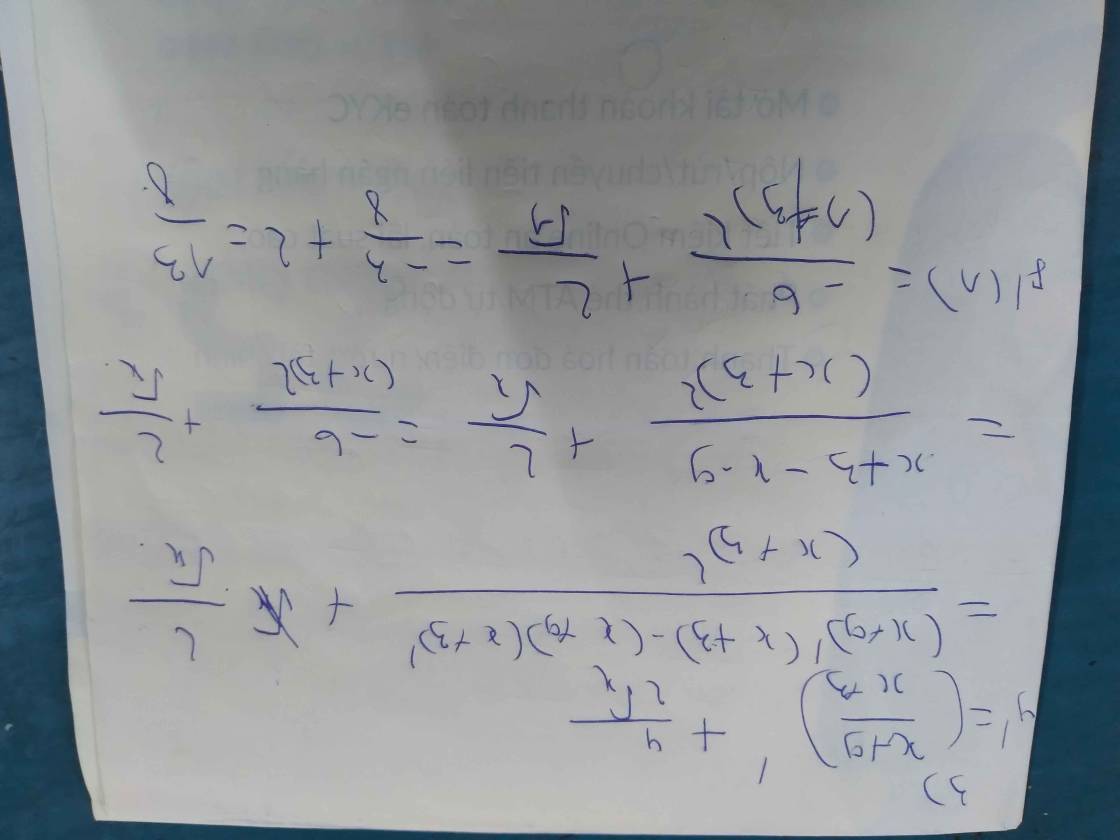Hãy nhập câu hỏi của bạn vào đây, nếu là tài khoản VIP, bạn sẽ được ưu tiên trả lời.

1. Áp dụng quy tắc L'Hopital
\(\lim\limits_{x\rightarrow0}\dfrac{\sqrt{x+1}-1}{f\left(0\right)-f\left(x\right)}=\lim\limits_{x\rightarrow0}\dfrac{\dfrac{1}{2\sqrt{x+1}}}{-f'\left(0\right)}=-\dfrac{1}{6}\)
2.
\(g'\left(x\right)=2x.f'\left(\sqrt{x^2+4}\right)=0\Rightarrow\left[{}\begin{matrix}x=0\\f'\left(\sqrt{x^2+4}\right)=0\end{matrix}\right.\)
\(\Leftrightarrow\left[{}\begin{matrix}x=0\\\sqrt{x^2+4}=1\\\sqrt{x^2+4}=-2\end{matrix}\right.\)
2 pt cuối đều vô nghiệm nên \(g'\left(x\right)=0\) có đúng 1 nghiệm

1) \(y=x^2-3\sqrt[]{x}+\dfrac{1}{x}\)
\(\Rightarrow y=2x-\dfrac{3}{2\sqrt[]{x}}-\dfrac{1}{x^2}\)
2) \(f\left(x\right)=\dfrac{x+9}{x+3}+4\sqrt[]{x}\)
\(\Rightarrow f'\left(x\right)=\dfrac{1.\left(x+3\right)-1\left(x+9\right)}{\left(x+3\right)^2}+\dfrac{2}{\sqrt[]{x}}\)
\(\Rightarrow f'\left(x\right)=\dfrac{x+3-x-9}{\left(x+3\right)^2}+\dfrac{2}{\sqrt[]{x}}\)
\(\Rightarrow f'\left(x\right)=\dfrac{-6}{\left(x+3\right)^2}+\dfrac{2}{\sqrt[]{x}}\)
\(\Rightarrow f'\left(1\right)=\dfrac{-6}{\left(1+3\right)^2}+\dfrac{2}{\sqrt[]{1}}=-\dfrac{3}{8}+2=\dfrac{13}{8}\)

1) \(f\left(x\right)=2x-5\)
\(f'\left(x\right)=2\)
\(\Rightarrow f'\left(4\right)=2\)
2) \(y=x^2-3\sqrt[]{x}+\dfrac{1}{x}\)
\(\Rightarrow y'=2x-\dfrac{3}{2\sqrt[]{x}}-\dfrac{1}{x^2}\)
3) \(f\left(x\right)=\dfrac{x+9}{x+3}+4\sqrt[]{x}\)
\(\Rightarrow f'\left(x\right)=\dfrac{1.\left(x+3\right)-1.\left(x+9\right)}{\left(x-3\right)^2}+\dfrac{4}{2\sqrt[]{x}}\)
\(\Rightarrow f'\left(x\right)=\dfrac{x+3-x-9}{\left(x-3\right)^2}+\dfrac{2}{\sqrt[]{x}}\)
\(\Rightarrow f'\left(x\right)=\dfrac{12}{\left(x-3\right)^2}+\dfrac{2}{\sqrt[]{x}}\)
\(\Rightarrow f'\left(x\right)=2\left[\dfrac{6}{\left(x-3\right)^2}+\dfrac{1}{\sqrt[]{x}}\right]\)
\(\Rightarrow f'\left(1\right)=2\left[\dfrac{6}{\left(1-3\right)^2}+\dfrac{1}{\sqrt[]{1}}\right]=2\left(\dfrac{3}{2}+1\right)=2.\dfrac{5}{2}=5\)

1, \(y=2-sin\left(\dfrac{3x}{2}+x\right).cos\left(x+\dfrac{\pi}{2}\right)\)
\(y=2-\left(-cosx\right).\left(-sinx\right)\)
y = 2 - sinx.cosx
y = \(2-\dfrac{1}{2}sin2x\)
Max = 2 + \(\dfrac{1}{2}\) = 2,5
Min = \(2-\dfrac{1}{2}\) = 1,5
2, y = \(\sqrt{5-\dfrac{1}{2}sin^22x}\)
Min = \(\sqrt{5-\dfrac{1}{2}}=\dfrac{3\sqrt{2}}{2}\)
Max = \(\sqrt{5}\)

1. \(y'=3x^2\sqrt{x}+\dfrac{x^3-5}{2\sqrt{x}}=\dfrac{7x^3-5}{2\sqrt{x}}\)
2. \(y'=3x^5+\dfrac{3}{x^2}+\dfrac{1}{\sqrt{x}}\)
3. \(y'=2-\dfrac{2}{\left(x-2\right)^2}\)

\(\lim\limits_{x\rightarrow0}\dfrac{\sqrt[3]{ax+1}-\sqrt[]{1-bx}}{x}=\lim\limits_{x\rightarrow0}\dfrac{\dfrac{ax}{\sqrt[3]{\left(ax+1\right)^2}+\sqrt[3]{ax+1}+1}+\dfrac{bx}{1+\sqrt[]{1-bx}}}{x}\)
\(=\lim\limits_{x\rightarrow0}\left(\dfrac{a}{\sqrt[3]{\left(ax+1\right)^2}+\sqrt[3]{ax+1}+1}+\dfrac{b}{1+\sqrt[]{1-bx}}\right)=\dfrac{a}{3}+\dfrac{b}{2}\)
Hàm liên tục tại \(x=0\) khi:
\(\dfrac{a}{3}+\dfrac{b}{2}=3a-5b-1\Leftrightarrow8a-11b=3\)

1a.
\(y'=3x^2.f'\left(x^3\right)-2x.g'\left(x^2\right)\)
b.
\(y'=\dfrac{3f^2\left(x\right).f'\left(x\right)+3g^2\left(x\right).g'\left(x\right)}{2\sqrt{f^3\left(x\right)+g^3\left(x\right)}}\)
2.
\(f'\left(x\right)=\left(m-1\right)x^3+\left(m-2\right)x^2-2mx+3=0\)
Để ý rằng tổng hệ số của vế trái bằng 1 nên pt luôn có nghiệm \(x=1\), sử dụng lược đồ Hooc-ne ta phân tích được:
\(\Leftrightarrow\left(x-1\right)\left[\left(m-1\right)x^2+\left(2m-3\right)x-3\right]=0\)
\(\Leftrightarrow\left[{}\begin{matrix}x=1\\\left(m-1\right)x^2+\left(2m-3\right)x-3=0\left(1\right)\end{matrix}\right.\)
Xét (1), với \(m=1\Rightarrow x=-3\)
- Với \(m\ne1\Rightarrow\Delta=\left(2m-3\right)^2+12\left(m-1\right)=4m^2-3\)
Nếu \(\left|m\right|< \dfrac{\sqrt{3}}{2}\Rightarrow\) (1) vô nghiệm \(\Rightarrow f'\left(x\right)=0\) có đúng 1 nghiệm
Nếu \(\left|m\right|>\dfrac{\sqrt{3}}{2}\Rightarrow\left(1\right)\) có 2 nghiệm \(\Rightarrow f'\left(x\right)=0\) có 3 nghiệm

a/ \(y=\left(x^3-3x\right)^{\dfrac{3}{2}}\Rightarrow y'=\dfrac{3}{2}\left(x^3-3x\right)^{\dfrac{1}{2}}\left(x^3-3x\right)'=\dfrac{3}{2}\left(3x^2-3\right)\sqrt{x^3-3x}\)
b/ \(y'=5\left(\sqrt{x^3+1}-x^2+2\right)^4\left(\sqrt{x^3+1}-x^2+2\right)'=5\left(\sqrt{x^3+1}-x^2+2\right)^4\left(\dfrac{3x^2}{\sqrt{x^3+1}}-2x\right)\)c/
\(y'=14\left(x^6+2x-3\right)^6\left(x^6+2x-3\right)'=14\left(x^6+2x-3\right)^6\left(6x^5+2\right)\)
d/ \(y=\left(x^3-1\right)^{-\dfrac{5}{2}}\Rightarrow y'=-\dfrac{5}{2}\left(x^3-1\right)^{-\dfrac{7}{2}}\left(x^3-1\right)'=-\dfrac{15x^2}{2\sqrt{\left(x^3-1\right)^7}}\)


Lời giải:
\(x\in [-\sqrt{2}; \sqrt{2}]\Rightarrow x^2\leq 2\Rightarrow \sqrt{x^2+1}\leq \sqrt{3}\)
\(y=\frac{x+1}{\sqrt{x^2+1}}\geq \frac{x+1}{\sqrt{3}}\geq \frac{-\sqrt{2}+1}{\sqrt{3}}\)
Vậy $y_{\min}=\frac{-\sqrt{2}+1}{\sqrt{3}}$ khi $x=-\sqrt{2}$
$y^2=\frac{x^2+2x+1}{x^2+1}=1+\frac{2x}{x^2+1}$
$y^2=2+\frac{2x-x^2-1}{x^2+1}=2-\frac{(x-1)^2}{x^2+1}\leq 2$
$\Rightarrow y\leq \sqrt{2}$
Vậy $y_{\max}=\sqrt{2}$ khi $x=1$